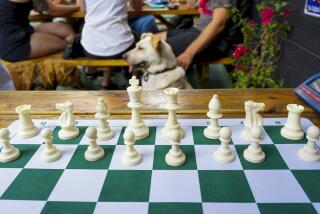After Sudden Defeat, It’s Kasparov Who’s Blue
- Share via
In a shockingly sudden conclusion to their much-hyped battle, the IBM supercomputer Deep Blue took barely an hour Sunday to defeat world chess champion Garry Kasparov, clinching a $1.1-million duel between brain power and processing speed.
Kasparov resigned after the computer’s 19th move in game six. Visibly upset, he stormed from the table, shrugging his shoulders. The final score was 3 1/2-2 1/2 in Deep Blue’s favor.
At a news conference later, he lashed out at IBM for programming the computer specifically to beat him.
“It was nothing to do about science. . . . It was zeal to beat Garry Kasparov,” he said. “And when a big corporation with unlimited resources would like to do so, there are many ways to achieve the result. And the result was achieved.
“I feel confident that the machine hasn’t proved anything yet,” Kasparov added. “It’s not yet ready, in my opinion, to win a big contest.”
C.J. Tan, the scientist who headed the Deep Blue effort, said he and his team “are indeed very proud that we’ve played a role in this historic event.”
“This is a match that will benefit everyone, from the students who sat in the audience learning from Garry and Deep Blue to many consumers outside of this building who will be deeply affected by this advance in technology,” Tan added.
Even those who predicted that computers would eventually surpass humans at the chessboard could not have anticipated Sunday’s massacre in New York City.
Until a week ago, the 34-year-old Kasparov was unquestionably the best chess player in the world.
More than once he proclaimed computers would never attain the level of the best human players. He began this match May 3 with a win that, while hardly routine, seemed to show the unmatched value of human intuition.
The tide turned with Deep Blue’s victory in the second game, almost certainly the best game ever played by a computer.
In the next three games, Kasparov outplayed the machine but had to settle for draws. The sixth game was quite different.
Playing black, Kasparov chose the Caro-Kann Defense, a respectable opening that he had used early in his career. In fact, Kasparov co-wrote a book about the Caro-Kann shortly before he became champion in 1985.
For some reason, Kasparov chose a discredited seventh move, which provoked a sacrifice of a knight by Deep Blue. The game followed known paths until move 11, but Kasparov’s new idea of 11 . . . b5 did not get black out of trouble.
The final position strongly favors white, but Kasparov’s early resignation puzzled observers. Almost any grandmaster would continue to play as black.
Grandmaster John Fedorowicz, said: “Everybody was surprised that he resigned because it didn’t seem lost.”
Some suggested that Kasparov succumbed to the pressure of facing a nonhuman opponent in a contest watched by millions around the world.
Kasparov admitted as much at the postgame news conference. He said he was “ashamed” of his performance, adding, “I could hardly explain what I did today.”
Then he lashed out at IBM, the match sponsor, claiming that Tan had an “obligation to publish the printout of everything Deep Blue was doing in this match.” Tan replied that the printouts would be available “at an appropriate time.”
Kasparov on Sunday night questioned the origin of several of Deep Blue’s moves and pointedly voiced skepticism about the computer’s actions in the second game. In that game, Deep Blue played splendidly until its final move, which gave Kasparov a chance to save a draw. Kasparov missed the opportunity and resigned.
“I still don’t understand how the machine couldn’t see that,” he said.
When directly asked if he was accusing the IBM team of cheating, he said: “I suggested that there were things in this match well beyond my understanding. . . . There’s probably no way to prove that Deep Blue is making this move or that move.”
During the news conference, Kasparov also said the match was unfair because he had not seen any games played by this version of Deep Blue, and could not prepare for his opponent as he would for another grandmaster.
Kasparov had beaten an earlier version of the computer by a 4-2 score in Philadelphia in February 1996. Since then, IBM engineers have upgraded the machine.
This was the first time Kasparov ever lost a chess match. He trailed 3-5 with 40 draws in his 1984-85 world championship match against Antoly Karpov when the match was stopped without a winner. Since then, Kasparov has won five world championship matches and tied one other.
Kasparov said that “my biggest mistake was following the advice of computer advisors” who told him to alter his playing style to exploit Deep Blue’s supposed weaknesses.
It may be true that the final score reflects Kasparov’s failure rather than Deep Blue’s prowess, but experts said IBM’s accomplishment should not be minimized.
The programming team created a 1.4-ton marvel consisting of 32 processors and special chess microchips. Using brute force calculation, it defeated one of the best chess players in history.
IBM sponsored the match as a test of parallel processing, the technique Deep Blue uses to examine 200 million positions every second. The IBM team expects that parallel processing can be used for complicated tasks such as weather forecasting, air-traffic control and molecular dynamics.
Kasparov will receive $400,000, the loser’s share of the purse. IBM will apply the $700,000 winner’s share to further research.
Here are the moves of the last game.
Deep Blue - Kasparov #6: 1 e4 c6 2 d4 d5 3 Nc3 dxe4 4 Nxe4 Nd7 5 Ng5 Ngf6 6 Bd3 e6 7 N1f3 h6 8 Nxe6 Qe7 9 0-0 fxe6 10 Bg6+ Kd8 11 Bf4 b5 12 a4 Bb7 13 Re1 Nd5 14 Bg3 Kc8 15 axb5 cxb5 16 Qd3 Bc6 17 Bf5 exf5 18 Rxe7 Bxe7 19 c4, Black Resigns.
Times wire services contributed to this story.


